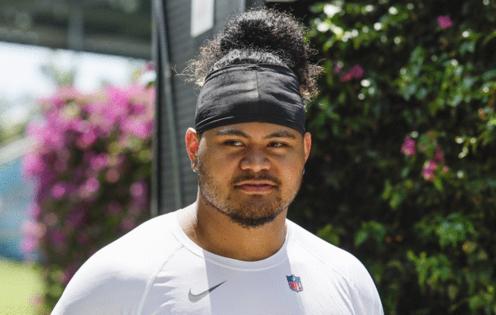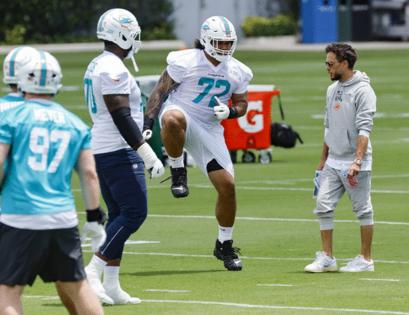Omar Kelly: Jonah Savaiinaea and other second-round picks can create NFL necessary change
Published in Football
MIAMI — Jonah Savaiinaea’s football conditioning, mastery of the offense, playbook and his technique are critical to the Miami Dolphins’ success in 2025.
Dolphins management traded a significant amount of resources to move up 11 spots in the 2025 NFL draft to select the University of Arizona offensive lineman early in the second round with the intent of making him one of the team’s two starting guards.
His development is a major story line of training camp, which technically begins Tuesday when the rookies report.
But unfortunately for the team, a healthy Savaiinaea might be forced to sit out days, if not weeks of training camp because the versatile and athletic lineman plays an important role when it comes to the NFL’s future, and its workforce’s multidecade push for contracts to become fully guaranteed.
First-round picks are typically the only players in the NFL who have their entire contracts fully guaranteed at the initial signing. That has been the case since 2011 when the Collective Bargaining Agreement changed, and subsequently drastically reduced the rookie salary scale.
However, two of the 32 second-round picks had their entire rookie deals guaranteed this year, and agents around the league (and the NFLPA if they smarten up) intend to create a domino effect that possibly changes how the NFL does business.
If each 2025 second-round pick holds out until his four-year deal (which is worth $7.1 million for the last pick (64), and $11.8 million for the 33rd pick) is fully guaranteed then that becomes two of the seven rounds of the draft that have their rookie deals guaranteed.
And maybe in the next year or two it will become the third-rounders, and the year or two after that the fourth rounders, and so on and so on.
Football is the most popular profitable, and brutal American professional sport, and ironically it’s the only one where the contracts players sign aren’t guaranteed.
But what most people don’t know is that there isn’t any Collective Bargaining Agreement (CBA) language that makes NBA, NHL and MLB contracts guaranteed, it’s just the way those sports have done business over time, and it eventually became the culture of those leagues.
That’s what needs to happen to football, and there’s no better time than now considering collegiate NIL contracts are steadily soaring (SEC starters reportedly earn at least $800,000 based on agent sources).
We will soon get to the point where college football teams might be offering a player projected as a second or third-round pick more money than the NFL, which pays rookies a signing bonus based on the round they are selected in, and a $840,000 base salary this season.
Coincidentally, that base salary goes up based on playing-time incentives for young players not drafted in the first or second round because they aren’t eligible. That might explain why former tight end Durham Smythe was nearly making double what Mike Gesicki was earning in the fourth year of their rookie deals when they came from the same draft. The difference was Smythe was a fourth-round pick, selected two round behind Gesicki.
The prevalence of guaranteed contracts in the NBA, MLB and NHL are largely produced by the demand for these top athletes, rather than a specific mandate in CBA language.
But NFL owners, and the people who work for them on behalf of the team, are dead set against this, especially since the NFL has the largest workforce. The league was actually caught colluding against that workforce to prevent guaranteed salaries based on an independent investigation recently done.
This past decade only two quarterbacks received full guaranteed contracts. Minnesota gave Kirk Cousins one in 2018, and Cleveland gave Deshaun Watson the second in the five-year, $230 million renegotiated deal he got after the Browns traded for him in 2022.
An independent investigation found that NFL owners and management colluded to ensure that nobody followed Watson during the offseason Lamar Jackson, a two-time MVP, because a free agent in 2023, and nobody but the Ravens bid on his services.
And what was the NFL’s punishment for these collusion findings? A slap on the wrist, maybe.
Nothing will ever change until a select group of NFL players and their agents take a stand, and this might be that time.
Maybe missing the team’s starting guard for the first month of training camp will force the Dolphins to eventually cave on their collusive efforts. After all, we’re haggling over guaranteeing $2.4 million more of the $11.3 million Savaiinaea is expected to earn during the next four years.
Keep in mind that NFL owners haven’t taken a financial loss in decades, and the salary cap has nearly doubled from a decade ago when the cap was $143.3 million. It has risen by $135.9 million in a decade, to $279.2 million which means each team’s profits have doubled as well since the cap is based on profit sharing.
And that’s annually.
We’re at the point where Dolphins owner Steve Ross has reportedly turned down a $10 billion offer to sell his franchise, and sports holdings, which he initially paid $1.1 billion for in 2009.
Talk about a return on an investment!
So crying poverty isn’t the right approach, especially to player advocates like myself, who can name two dozen players I’ve covered since 2007 struggling with endless medical issues they developed from playing this brutal sport.
At some point something has to give if the NFLPA wants to create change, inching toward guaranteed contracts for its workforce.
This is up to the teams and agents to figure out, but at some point the NFL has to negotiate in good faith, which would be a complete about-face of how they’ve done business for 50-plus years.
Hopefully Savaiinaea and these 28 other second-round picks are willing to become the 32 players who create the necessary change by sidelining themselves, holding out.
____
©2025 Miami Herald. Visit miamiherald.com. Distributed by Tribune Content Agency, LLC.










Comments